Discovery rolls out to launch pad

The US shuttle Discovery has rolled out for what should be its final mission. The orbiter completed its slow journey to the Kennedy Space Center's Launch Pad 39A overnight, Monday into Tuesday. Every step of the 5.4km (3.4-mile) crawl was bathed in bright xenon light. Discovery's flight to the space station is scheduled to begin on 24 February. With its crew of six astronauts, the ship will deliver a storeroom to be attached to the 350km-high platform, along with further supplies and spares. Stacked with its external fuel tank and solid rocket boosters, Discovery took seven hours to complete the roll from Kennedy's vast Vehicle Assembly Building to complex 39A. Many Kennedy employees, along with their families, came to witness the event. Nasa last tried to launch the vehicle in November but technical hitches, including cracks on its giant external fuel tank, kept the ship on the ground. The agency said engineers had now fixed those defects and carried out further work to st













